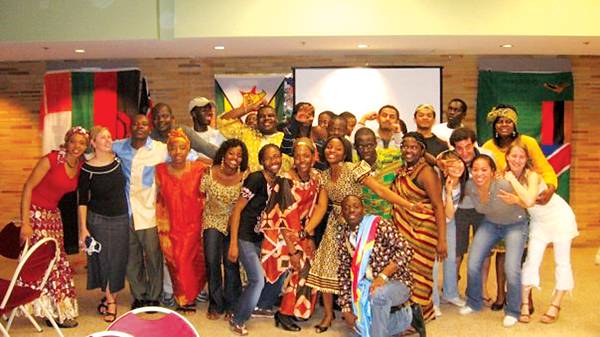Africa rich in culture, tradition, history

Although Africa is drastically different north to south, the people of each country share with one another pride in their traditions, histories and cultures. Many African countries practice fellowship within their communities, with a strong emphasis on family. Photo Courtesy: Ekoukou Materania
February 26, 2009
There are two different continents of Africa, one assistant professor explains — the “CNN Africa,” which American media portrays as being impoverished, desolate and torn apart by war, and the real Africa, a continent rich in history, diversity and traditions.
The American media has fostered a number of misconceptions about Africa, said Hsain Ilahiane, assistant professor of anthropology and native of Morocco. First and foremost, Africa is not a country – but a continent, he said. It was a friend of Ilahiane’s who first described the Africa portrayed by American media as “CNN Africa.”
The poverty of Africa is one of its biggest misconceptions, Ilahiane said.
“Africa is not poor,” Ilahiane said. “There is poverty but not every African country is poor.”
Africa is advancing technologically. According to an article from the McClatchy Washington Bureau, the African country of Kenya has implemented a program called M-PESA, which allows people to send and receive money by using mobile phones. Ilahiane did research on the M-PESA in Kenya a couple years ago.
Ilahiane said people often overlook the diversity of the continent.
“Africa is very diverse from the north to the south,” Ilahiane said.
“Different people, different cultures, different colonialism, even … it’s not just one place, so it’s very rich.”
Africa is also a continent rich in natural wealth, though the type of wealth differs from that of the United States. In terms of resources, Africa is much more affluent.
Ekoukou Materania, junior in construction engineering and liaison officer for the African Student Alliance, grew up in Africa, in a village in the east side of the Democratic Republic of the Congo.
He moved to North America in 2001 with his family. Materania then came to Iowa to pursue his college education.
“Growing up over there, I never felt like I was poor,” Materania said. “The knowledge is not there because you are adapted to a culture that you are used to.”
Materania said there are cultural differences between Africa and the United States.
“There are things you can do that don’t involve money like sitting down and conversing with your people,” Materania said. “Over here you can’t just sit down and converse with your people because you’d be wasting time … time is money!”
Growing up in the Congo, Materania said, was “all happiness.”
He said he has memories of playing soccer in the rain with a group of friends and listening to his grandfather tell stories .
Materania described the Congo as being a country with large open spaces and cities – much like the American Midwest. Buildings in Congo cities are similar to those built in the United States.
“There’s no difference between America and Africa as far as infrastructure is concerned,” Materania said.
The composition of cultures in the Congo cities is diverse. Different cultures are “mixed” together in urban areas. Materania described Congo cities as being “westernized.”
Traditions are still kept in the cities, however, villages are where the traditions and values are “kept and maintained properly.” Villages are the “heart” of Congo culture, Materania said.
“The village is where traditions are practiced,” Materania said. “Everything you do as a culture is practiced in the village.”
Respecting elders is one of the many cultural traditions kept in the Congo.
“You never want to overshadow your elders,” Materania said. “Your elders are the ones that have the knowledge.”
In Morocco, family is one value of utmost importance, Ilahiane said.
“I don’t know Africa from north to south…but there is a tendency to stress the collectivity … of the culture,” Ilahiane said.
There is the understanding that family is the most important component of growing up, therefore it is important to show respect, Ilahiane said.
Ilahiane and Materania both hope to visit their homes in Africa again soon.
“The unique part of all of Africa,” Materania said, “is that we are people who embrace people.”
Quick facts on Africa’s nations
Nigeria – Located in western Africa, Nigeria is the most heavily populated country in Africa, with a population of 135,031,164. English is the official language. It’s composed of more than 250 ethnic groups. Nigeria gained independence from Britain in 1960.
Egypt – Located in northern Africa, Egypt is second-most heavily populated country in Africa, with a population of 80,335,036. Arabic is the official language. It’s composed of mostly Sunni Muslims.
Democratic Republic of the Congo – Located in central Africa, the Democratic Republic of the Congo has a population of 65,751,512. French is the official language. Morocco – Located in northern Africa, Morocco has a population of 33,757,175. Arabic is the official language. Arab-Berber is the main ethnic group.
—Information from aneki.com – world rankings website
African Student Alliance meets from 5:30 to 6:30 on Fridays in Carver 268. It is a group composed of students from Africa and students who are interested in learning about African Cultures.






